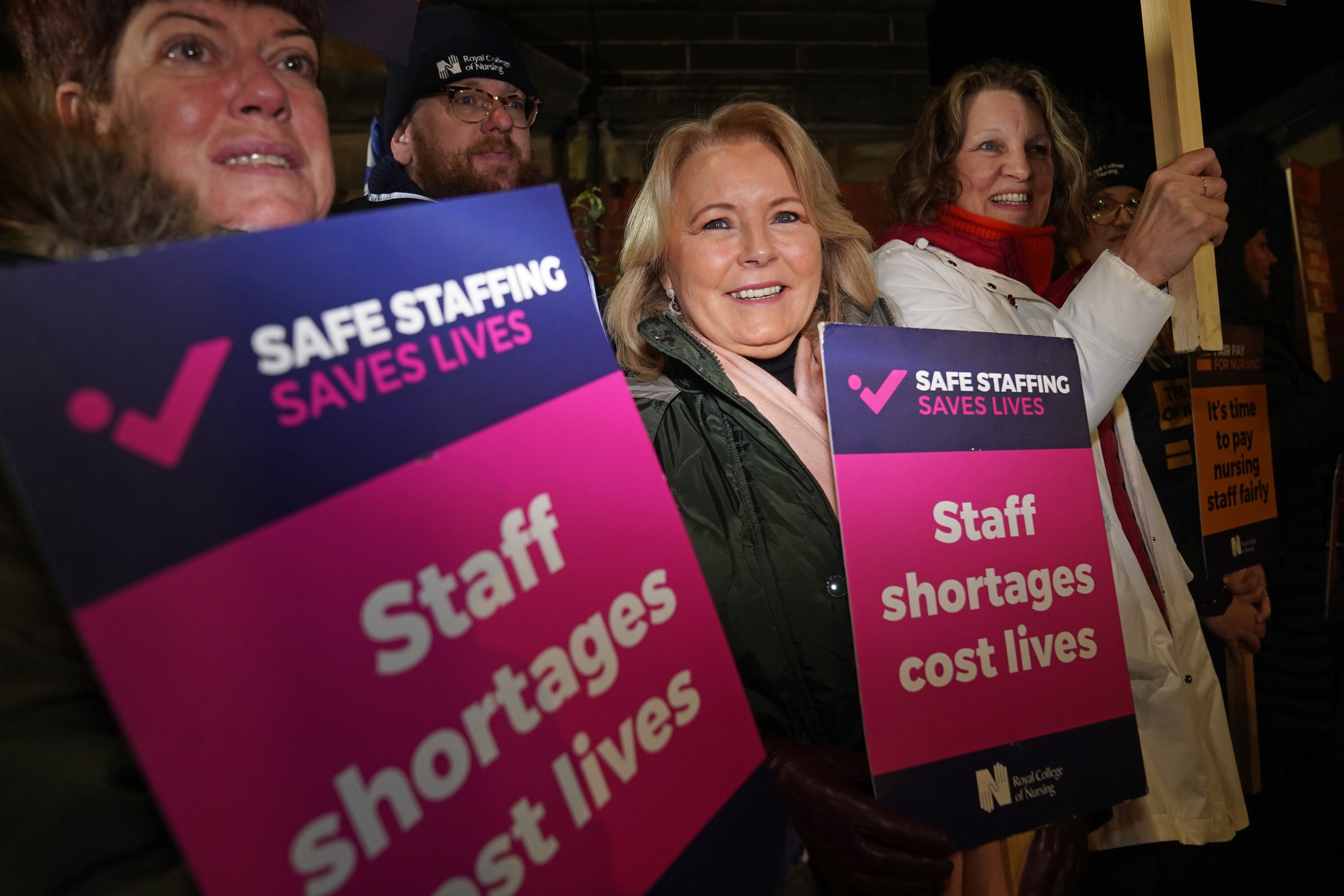
Rishi Sunak’s government is said to be considering a “one-off” payment for nurses and ambulance workers to end strikes causing major disruption in the NHS.
The prime minister sparked a “chink of optimism” about a possible pay boost for health workers after he signalled a willingness to address higher pay demands for the first time.
Health secretary Steve Barclay is expected to focus on the next year’s pay review process – rather than the current pay dispute – when he meets heath union leaders on Monday morning.
But ministers are reportedly looking at a “one-off” payment to nurses and ambulance, possibly in the form of cost of living payment, to prevent looming strikes, according to The Guardian.
Mr Sunak did not rule out a one-off payment when asked about the idea on Monday. “You wouldn’t expect me to comment on specifics, but the most important thing is that the conversations are happening,” the PM told reporters.
Health workers in Wales have been offered such a payment to avoid more strike action. But No 10 and the Treasury have been accused of blocking a one-off payment after the idea was reportedly suggested by Mr Barclay.
Despite the government’s insistence that Monday’s meeting is focused on the 2023-24 pay review, some union leaders expressed cautious optimism after Mr Sunak said he was “open” to discussing health workers’ pay.
Asked on BBC’s Sunday With Laura Kuennseberg whether talks could include the 2022-23 pay dispute “right here, right now”, the prime minister replied: “We want to have these conversations.”
But Mr Sunak also added: “We’re about to start a new pay settlement round for this year [2023-4]. Before that process starts, the government is keen to sit down with the unions and talk about pay and make sure they understand where we’re coming from.”
Royal College of Nursing (RCN) chief Pat Cullen said Mr Sunak’s comments offered a “chink of optimism” that strikes set to start in mid-January could still be avoided, with his comments representing a “little shift”.
RCN director for England Patricia Marquis told Sky News on Monday that there was less than 50-50 chance of avoiding strikes from mid-January, saying a breakthrough was “unlikely” today.
“If there are chinks of hope, if there are further meetings, then I and my colleagues will all maintain optimism that we can get a resolution,” she said ahead of talks.
Unite’s Sharon Graham said Mr Sunak was “misleading” the British public about the “so-called pay talks”, while the GMB union also poured cold water on the idea of a breakthrough, describing Monday’s meeting as a “box ticking exercise”.

Thousands of junior doctors in England will start voting on Monday on whether to strike for three days in March. Nurses are already set to strike on 18 and 19 January, while ambulance staff will walk out on 11 and 23 January.
Mr Barclay hinted that striking NHS staff could be offered a better pay deal from April – if union leaders accept “productivity and efficiency” reforms in return.
Asked about the idea of a pay rise in return for efficiency reforms, Ms Marquis said: “That, for me, makes me very, very worried – it shows a level of misunderstanding of the situation the NHS and nursing is in at the moment.”
The RCN director added: “Of course, there’s always some sort of efficiencies that can be made but it really does sound like what they’re trying to do is get ... the NHS to fund its own pay award and we don’t think that’s possible.”
Asked if the nurses were losing support ahead of fresh strikes, Ms Marquis said: “I don’t think we are losing the battle – I think the government are losing the battle,” before repeating calls for Mr Barclay to negotiate on the current pay dispute.
Labour’s shadow health secretary Wes Streeting said the RCN’s call for the government to meet it “halfway” on its 19 per cent pay rise demand – around 10 per cent – should be “good starting point” for talks.
On Monday the health secretary is also set to announce an extra £200m in funding to buy up thousands of extra care home beds in a bid to ease current pressure on hospitals.
The extra money for integrated care boards is aiming at freeing up hospital beds so people can be admitted more quickly from A&E to wards.
A further £50m will go in additional capital funding for hospitals to expand discharge lounges and ambulance hubs to help tackle queues of paramedics waiting to hand over patients.
But the chief executive of Care England, Prof Martin Green, told BBC Radio 4’s Today programme that he is not clear on how the latest plan, buying care home beds in a bid to ease the NHS crisis, differs from the previous initiative.
Prof Green said the government “never, ever understand that they should learn from their mistakes”, adding: “So what this new money might do is it might alleviate an immediate problem but it will not get to the long-term root cause of the issues.”
Mr Streeting criticised the plans as “yet another sticking plaster”. He told BBC Breakfast that Labour would instead “tackle the root cause of the crisis” by recruiting more carers.
He called the planned January strikes a “cry for help” by NHS workers as he warned that staff are feeling a “real sense of moral injury”.
The Labour frontbencher said ministers needed to negotiate a “fair” deal with healthcare workers. “I think they’re speaking for the wider NHS workforce,” he added on striking staff.







